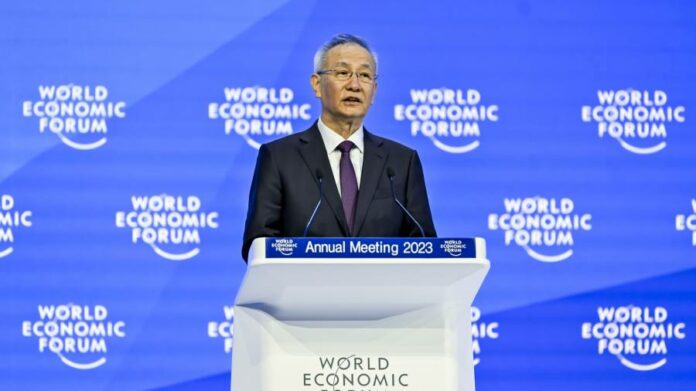China has passed its peak of Covid-19 infections and is returning to normal faster than the government expected, Beijing’s top economic official has told investors at the World Economic Forum.
“The majority of society has recovered to a normal state of affairs,” said Liu He, vice-premier and chief economic adviser to President Xi Jinping, in a speech at the forum’s international gathering in the Swiss resort of Davos on Tuesday.
“The speed of reaching the peak and speed of recovering normality were relatively fast, in a way exceeding our expectations.”
After ending its zero-Covid policy in December, China shut down its coronavirus testing apparatus and has published limited data on deaths, making it difficult to gauge the scale of infections. Instead, epidemiologists have relied on online surveys to measure the spread.
Earlier this month officials in Henan, one of China’s most populous provinces, said almost 90 per cent of the local population had been infected. Shengjie Lai, an epidemiologist at the University of Southampton, told the journal Nature that cities would have passed their infection peak by mid-January.
In contrast, Zeng Guang, former chief epidemiologist at the Chinese Center for Disease Control and Prevention, warned last week that the latest wave of Covid-19 infections was yet to peak, adding that family visits over this weekend’s lunar new year would result in a surge of cases in rural areas.
Liu said he was “extremely amazed” by estimates for travel figures over the 40 days surrounding the new year festivities. The transport ministry predicts travel over that period will be almost double what it was in 2022, and about 70 per cent of the pre-Covid level in 2019.
Liu is due to meet Treasury secretary Janet Yellen, his US counterpart, in Zurich on Wednesday for the first time in person, as Beijing and Washington rebuild face-to-face diplomatic relations.
Following a speech by European Commission president Ursula von der Leyen, who said the EU would seek to “de-risk” rather than “decouple” its trade with China and would use all its tools to deal with “unfair practices”, Liu sought to reassure his Davos audience of Beijing’s commitment to globalisation and marketisation.
“Some people say that China is pursuing a planned economy, but this is fundamentally impossible: Chinese people will not walk this path,” he said.
The vice-premier’s comments come after Beijing showed signs of relaxing a multiyear crackdown on the country’s technology titans that scuppered the planned public listing of Jack Ma’s Ant Group and forced ride-hailing group Didi to delist in New York.
This year’s appearance in Davos may be Liu’s last, as the 70-year-old prepares for retirement. At the 20th congress of the Chinese Communist party last year, he was one of several top officials responsible for economy and finance who stepped down from party posts.
“The market-reformist school of thought lacks a flag carrier,” said George Magnus, research associate at Oxford university’s China Centre. “The Davos rhetoric is aimed mostly at foreigners and foreign businesses. The government’s desire to have control over private firms and entrepreneurs isn’t changing at all.”
Liu insisted Beijing’s “common prosperity” policy aimed only to prevent economic polarisation and high levels of inequality.
“We are absolutely not about egalitarianism and welfarism,” said Liu, adding that the government stressed equality of opportunities, not of outcomes.






